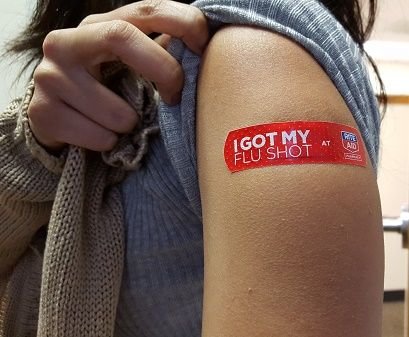Of course, parents should worry about their kids’ health. Of course, they should ponder carefully about what goes into their bodies. More fruit, less Froot Loops, amirite?
And when it comes to figuring out what’s right and what’s wrong for parents to do, it’s not always as straightforward as it should be.
Parents all too often hear conflicting advice from all kinds of voices all around them. Unfortunately, when it comes to flu vaccines, at least a third of parents are listening to the wrong voices.

That’s according to a report out of Michigan’s C.S. Mott Children’s Hospital. They conducted a survey of almost 2,000 parents regarding flu shots, and the answers were eye-opening.
The good news is that two-thirds of the respondents said they would be giving their kids flu shots this year, a critical protection against a nasty virus.
It’s the other third of parents, the ones who say they won’t be giving their kids flu shots, that is troubling. And it comes down to the concerning way they made their decision.
The poll found that those who wouldn’t be giving their kids flu shots were less likely to listen to their doctors for information. Instead, they trusted their friends, other parents, and, of course, the internet.
About 40% of the parents in the poll said they based their decision on what they read or heard, not their doctors. The parents who didn’t want to vaccinate their kids also reported seven times more negative sources about the vaccine than positive.
That’s a huge difference, and you just know that some of that negative info must have been faulty or outright lies, like saying the vaccine causes the flu. (It really doesn’t.)
The important takeaway here is how prone these parents are to having their fears and prejudices confirmed by myths and misinformation rather than medical professionals — you know, the folks who have actually spent years of their lives studying and practicing these things.
As the poll notes, it all creates an echo chamber that reinforces the parents’ doubts about the flu vaccine, and that puts their kids at risk.
It’s not wrong to listen to your friends or other parents when you’re looking for a reputable spot to book a birthday party or find a decent banana bread recipe. When it comes to medical advice, maybe not so much.

Would you ask the other soccer moms if you should have your appendix out or if that pain in your abdomen is nothing worth worrying about?
Make no mistake, the flu is serious, and kids under 5 are in one of the highest risk groups for catching the flu.

During the 2017-2018 flu season, 180 kids died from the flu, a season in which less than 60% of kids received the vaccine. And it’s not just the flu itself, but complications it can cause that can be troublesome too.
And the flu vaccine has been proven to work.

The CDC estimates that, in the 2016-17 flu season, the vaccine helped more than five million Americans avoid illness, and at least 26,000 hospitalizations.
Flu vaccines are recommended for all kids over six months of age, by the way.
Even the kids who are afraid of needles can benefit — a few tears are still much preferable to getting the flu, which can lead to a whole host of serious problems, and it’s a great excuse to go for ice cream afterwards.
However, the complicating and somewhat surprising factor in the poll actually came from medical professionals.
A full one-fifth of parents didn’t recall their child’s doctor even giving a recommendation of any kind about the flu vaccine.
It’s hard to say whether they just didn’t remember getting that advice, or if they actually didn’t get it, but it’s definitely challenging to make a responsible medical decision without a doctor’s opinion.
So making the decision to get your kid a flu shot has real consequences, and it’s important to get the best information you possibly can, and trust the people who know what they’re talking about.
Anybody can have an opinion, but not necessarily an informed opinion. Doesn’t it seem more than a little silly to cut doctors out of an important medical decision and instead go with what your mommy group says?
Honestly, we should all watch out for the echo chamber of voices ganging up to reinforce baseless fears and doubts built on misinformation.

















































